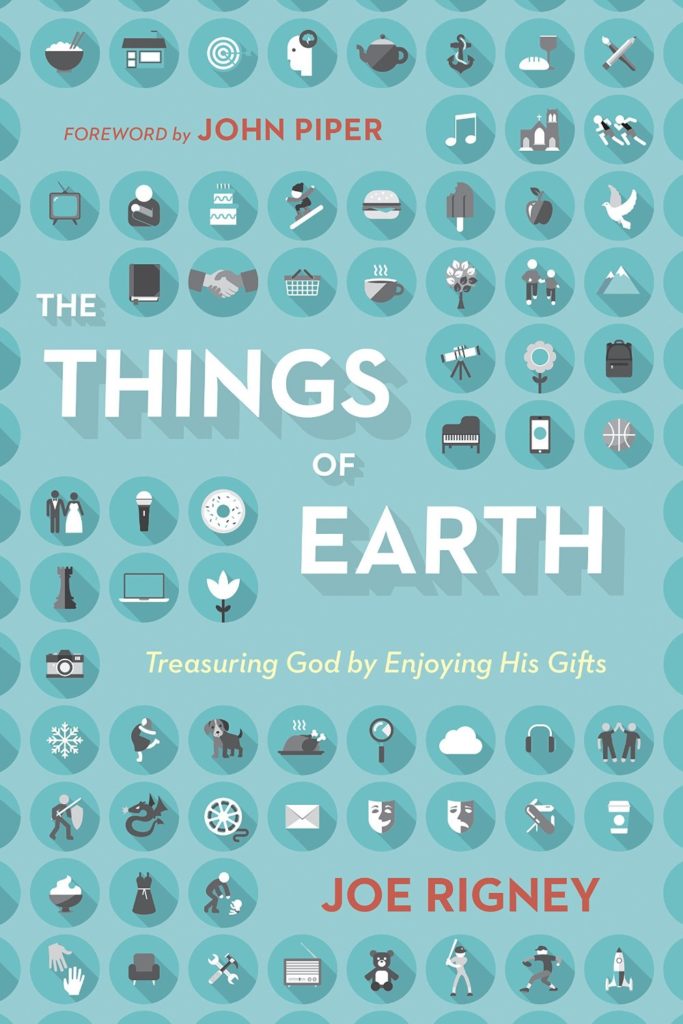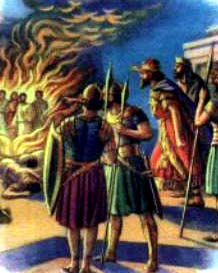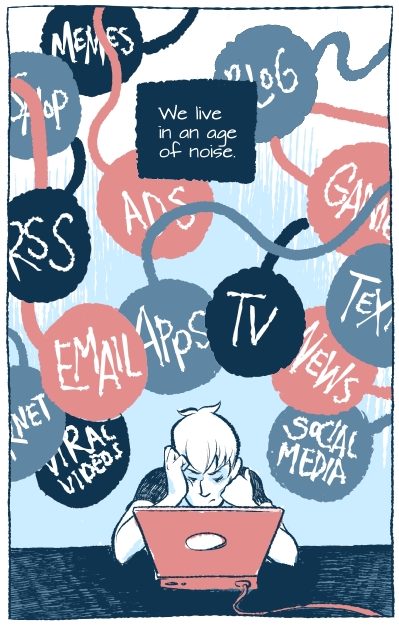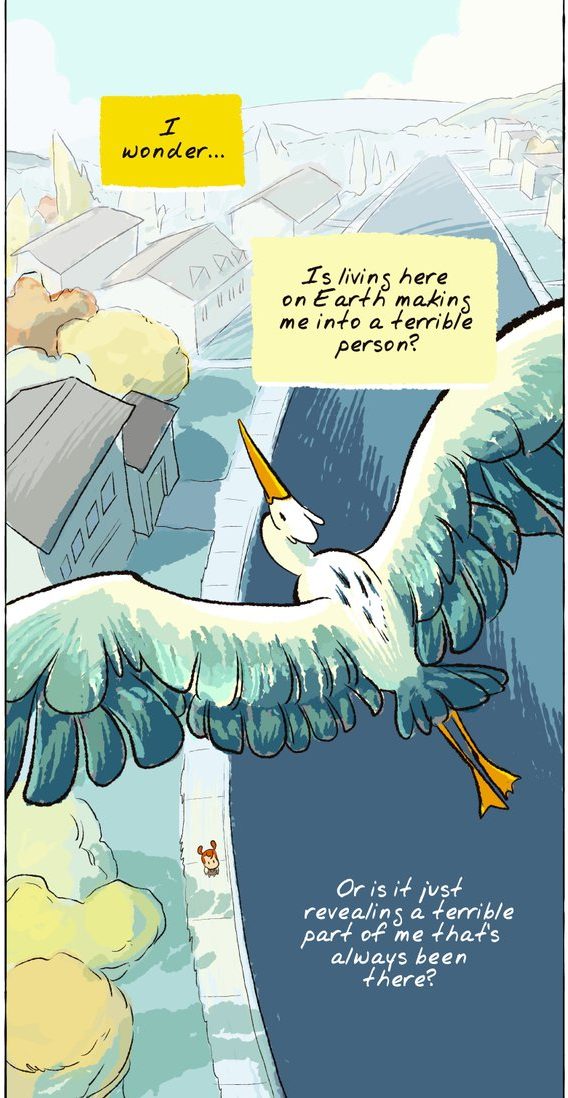Weâre one week into the PokĂ©mon GO augmented-reality smartphone game fad.
Iâve seen three types of Christian-written âhot takesâ on the game:
- The Culture Academic: Isnât it amazing how this game brings Community together?
- The Positive Parent: I wasnât sure about this at first. But my kids are going outside!
- The Concerned Christian: This game is âprobably harmless, but âŠâ
Iâd like to respond to that last group of Concerned Christians. Most of them are reasonable, only slightly flawed. (Some could also be called âProbably Harmless Butâ Christians.)
Iâll also address wackier notions, like âPokĂ©mon are demons,â and such. Theyâre an even smaller minority. But unless we rebuke them, even reasonable Christians (and critics) suspect this is the default Christian view.
For concerned Christians, I have ten challenges Iâd like us to consider.
1. Why assume we know what games or imagination are meant to do?
 Most Christian articles about Pokémon or any other fantasy ignore this question:
Most Christian articles about Pokémon or any other fantasy ignore this question:
Why did God provide us with popular culture? How does it fit in his plan?
Not every article can say all this. But if we donât address it sometime, we skip truth.
Hereâs an example from a ministry I absolutely love, Desiring God Ministries.
This is a mostly negative article, not just about PokĂ©mon. Words used include: obsessed, make-believe, fanatics, on-demand, binge, encroached, escape, drug, distracts, weakens, escape (again), ânever-ending pursuit to escape,â addiction, âcontempt towards God,â âtemporal escape,â and other uses of âescape.â Here comes the Probably Harmless But:
Weâre obsessed with fantasy. The explosion of interest surrounding PokĂ©mon Go is yet another example of our desire to escape the real world â of real people and real problems â and enter into a make-believe world, or at least an augmented one. ⊠Our ability to access entertainment and escape from reality has swiftly and effortlessly encroached on every aspect of our lives. ⊠Although these devices and platforms arenât inherently evil or sinful, they become dangerous when we develop habits of defaulting to them primarily or alone.
Is this all lies? Not at all. Is it a half-truth? Unfortunately, yes. The writer assumes there is no humanity in games or other âentertainmentâ (stories, songs, and more) for Christians.
He assumes such games are at best âharmless,â but have no place for humans in Godâs plan.
But letâs go back to the book of Genesis, and imagine Adam and Eve had never sinned. They and their children would have made stories and songs to glorify God. They would have made smartphones and games, or something very like them, for good reasons.
Indeed, Christians must avoid sinful abuse of anything. This is a risk because we are sinful.
But with stories, songs, fantasy, and games, we can also reflect our fantastical God today.
 âProbably Harmless Butâ-type Christians keep skipping this truth. And we canât go on like that. Because as Joe Rigneyâa fine writer of The Things of Earth, who is with Desiring God Ministriesâpoints out, we are not created to glorify God purely in some âspiritualâ ways. Godâs idea was to create us as creatures. And creatures glorify God in âcreaturelyâ ways. We cannot âevolveâ into spirit-beings to glorify Him infinitely. We are âstuckâ glorifying Him as human beings, with bodies and time and cycles of work and rest. God wants us to do this!
âProbably Harmless Butâ-type Christians keep skipping this truth. And we canât go on like that. Because as Joe Rigneyâa fine writer of The Things of Earth, who is with Desiring God Ministriesâpoints out, we are not created to glorify God purely in some âspiritualâ ways. Godâs idea was to create us as creatures. And creatures glorify God in âcreaturelyâ ways. We cannot âevolveâ into spirit-beings to glorify Him infinitely. We are âstuckâ glorifying Him as human beings, with bodies and time and cycles of work and rest. God wants us to do this!
2. Why confuse God-given work with God-given gratitude and rest?
Instead of meditating and praying, we go searching for Pokémon.
This is a false dichotomy. It presumes an old evangelical notion: that if we have any âspare time,â we ought only to spend it meditating and praying, and not doing other things.
But this is not how the Bible portrays prayer and meditation (that is, on Scripture). In fact, 1 Timothy 4:1-5 specifically refers to prayer and Scripture as Godâs means of making things, which He gives us, holy for our enjoyment. Sure, God does not design PokĂ©mon creatures or program smartphones. Neither does he bake bread. But we thank him for bread and popular games. He ârichly provides us with everything to enjoyâ (1 Tim. 6:17).
Scripture also teaches that humans ought to live in cycles of work and Sabbath rest, just as God established during creation week (Gen. 1).
- The Bible promotes hard work in our job as culture-makers (Gen. 1:28)
- The Bible also frequently promotes intentional rest from our labors.
The Old Testament is full of Godâs commands for his people to follow not only weekly Sabbaths, but regular and occasional feasts and celebrations that can last for days. The New Testament picks up with its verses about rest, gratitude, feasting, and living quietly.
So if someone writes about a game or other thing we can do during rest, and jumps instead to speaking about how we ought only to work, that is an apples-and-oranges comparison. There are times to encourage workaholics to rest, and vice-versa. But not every time.
3. Why call fantasies you donât understand âdemonicâ or âoccultâ?
Letâs explore a popular Christian article on PokĂ©mon going back to the pre-GO days.
I do not see how allowing children to play with games that encourage fighting, reading of minds, use of poison, mimicry, taunting, teleportation, hypnosis, and evolution can be a good thing. This is not training a child to righteousness, it is accepting the occult and secular evolution. Is this what we, as Christians, want our children to meditate on? Of course not.
The author runs a Christian apologetics website. But he assumes, and does not source, his claims that any of these imaginary things are necessarily part of the occult.
âUse of poisonâ is perplexing. âTeleportationâ does not occur in the real world.
If a Christian enjoys games or stories about fantasy creatures with special abilities, this does not automatically qualify as the occult actions Scripture warns against in passages like Deut. 18. Â If someone isnât wiling to discuss the connection, we need to stop assuming it. And we need to stop assuming âunfamiliarâ therefore means âdemonic.â
4. Why do you listen to professing pagan religion and accept it as true?
A Christian âmommy bloggerâ also shares her concerns about PokĂ©mon GO and safety:
Does the game or toy have symbols, characters, or other characteristics that link it to New Age or occult powers?
Like Slick, this writer assumes New Age or occult teachings promise people can learn to do these things in reality, and therefore we must avoid hints of this.
If a person wants to do anything apart from faith in the âfinal prophetâ God promised to send in Deut. 18, then yes, a Christian needs such cautions.
But where are these New Age or occult materials? How would we define âlinkâ?
If we did produce a book by a Wiccan follower promising to give us powers like a Pokémon creature, what would that prove? In Scripture, false prophets could often imitate miracles by a true prophet. Did that disqualify the legitimate prophet by association?
Let us not use âappearanceâ or âassociationâ to define what sin is. Thatâs not what God does.
Anyway, why should we listen to religions that compete with biblical Christianity? I think there is a little too much risk in getting infatuated with the âdark side.â This is risky if we assume we know what occultists teach. Perhaps this is even more risky if we show an unhealthful interest in their beliefs about demons. Letâs listen to Scripture instead.
5. Should we take any âspiritual warfareâ lessons from other Christians who may not actually be qualified?
The same blogger continues with a story about how a missionary asked a Christian man, a former âwitch doctorâ with occult experience, about PokĂ©mon:
Opening the book at random, showing him a picture I asked. âWhat do you think of this?â He looked at it, and said, âOh, I know this one.â He suddenly had my attention!
He went on, âOh, this is a nasty little demon. It is always underfoot, bites, scratches, screeches and what not.â I looked at the page, and on the list of attributes, the book said, âbites, scratches, screeches, clawsâŠâ and I forget what else, but it was as if Bautista was reading the page, and he does not read or speak one word of English. He made a believer out of me.
I figured that the first one could have been just a lucky guess, so I flipped the page to another picture and asked him about that one. Again, he told me exactly what itâs attributes were. He did that over and over.
There were some he did not recognize, and he said. âThere are so many demons, it is impossible for any one person to know them all.â
âAnd then the witch doctor, he told me what to doâ? Iâm not sure if this example counts as a trend among evangelicals, but when I was a kid I heard a similar anecdote about a newly converted witch doctor from deepest, darkest someplace. In this tale the new convert reacted with concern over a âChristian rockâ cassette a missionary kid was enjoying. The former âwitch doctorâ said the drum rhythms reminded him of his old tribal situations.
My short response is direct: why are mature Christians taking lessons on spiritual warfare, and what is or isnât acceptable, from other Christians? Especially when many of them can’t help but base their discernment on their own experiences or cultural associations?
Hereâs a longer response: the apostle Paul doesnât think this way.
In Romans 14 and 1 Corinathians 8â10, he explores freedom in things like holiday celebrations and foods. He says we must be sensitive to people who think what we do is sinful. (Notice he talks about real present, personal situations, not imaginary or hypothetical ones.)
But Paul might also call people like the former âwitch doctorâ a weaker brother, not a stronger brother. Weaker brothers do not have special knowledge of spiritual matters. In fact, they donât know that âan idol has no real existenceâ (1 Corinthians 8:4)! The stronger brother does know this. Of course, that doesnât mean the stronger brother gets to laugh at, mock, or dismiss the weaker brother. We must show love! But we must call things what they are.
If we skip this truth, we are putting tradition over Godâs written word. In fact, we are the ones acting like âwitch doctors,â whenever we imagine hazardous spiritual connections between a personâs old religion and imaginary creatures. (More on this in the next item.)
By the way, I asked the original author this very question. A few commenters repeated familiar lines to me about how they assume (from experience, not Scripture) that new believers who worshiped demons in other countries automatically know more than mature, biblical astute Christians in other countries (even the dreadful West).
This is a kind of spiritual ânoble savageâ or âmagical nativeâ trope that is common among some Christians. We must be sensitive to cultural differences and peopleâs backgrounds in real-life occult religions. But we must not let them override biblical theology.
6. Do we accept unbiblical mysticism or âwhite magicâ to avoid harm?
This was huge! I ran upstairs and got our youngest son, who did happen to like the pokeman [sic] cartoons (his aunt sent him VHS tapes of them). When he got downstairs, I had Bautista flip through the book again, explaining to my son what he knew about these ugly little pictures.
Well, he made a believer out of Stephen! He went back upstairs and came back down with his prized tape and while we watched, destroyed it. Bautista looked on with curiosity, not really understanding what Stephen had just done. I quickly brought him up to speed and thanked him for helping to open our eyes.
This is a fun story, but notice the aside here? The writer refers to her son, who is a PokĂ©mon fan. She dismisses his enjoyment of âugly little pictures.â How is this a âspiritualâ judgment? Unfortunately, some Christians also take one more step and call such images âdemonic.â (As if demons donât also sometimes appear as âangels of lightâ!)
What if we treated people themselves like that? What if the missionaries in the âwitch doctorâsâ country recoiled from him because he was âuglyâ to their eyes? God forbid.
In this story, the parent did not interact with the child about why he enjoyed the shows. The parent did not seem interested in having a conversation with the son to check his heart, or ask if this show was actually causing the son temptation (either to contact demons, or even âsmallerâ temptations such as obsession with the series, acting aggressively, and so on). The parent did not engage the popular culture with the child.
Instead it appears the parentâs impulse was simply to fear and destroy the object.
Such anecdotes are also common among some Christian circles. Well-meaning Christians often think about Acts 19:19, in which new believers confess their own practice of magic arts, then burn their books. In similar old anecdotes, Christian parents literally burned their childrenâs music cassettes, fearing they contained a demonic presence like germs.
But the believers mentioned in Acts did not have this reason. They volunteered their âpurgeâ as a sign of their repentance from actual sin. Is the child with a video automatically so guilty? Did the child actually practice magic arts? If not, there is no connection.
Instead of literally purging evil in obedience, parents may risk practicing a kind of âwhite magicâ in the exact way God forbids in Deuteronomy 18. In this chapter, God tells his covenant people he does not want them to follow worldly means of trying to protect themselves or discern his will outside the means he has given us (the Final Prophet, Jesus Christ). That is why he forbids sorcery and divination. But when we try to âdivineâ evil presence in objects, are we not acting exactly the way pagans act? Do we distrust in His final prophet, Jesus?
7. Do we accept personal feelings as âpromptingsâ over the word of God?
Bautista added, âTell the people from your churches, that if there are things that make them feel uncomfortable, it is probably not good. Godâs Spirit will speak to them about what is right and wrong.â âŠ
Pray. Ask God to give you His mind on the matter and to lead you. The Holy Spirit leads us into truth. Will we follow His leading?
Technically I would agree with this statement. But when I read âThe Holy Spirit leads us to truth,â I hear, âHe leads us back to the Bible, the written word of God for all Godâs people.â
Other Christians have different views on how God reveals his will to us. Some believe in a kind of âleadingâ from the Holy Spirit with feelings, prompts, or ânudges.â
I would disagree that the Spirit regularly leads us this way (although He certainly can).
But I would rather start by challenging the notion that all Christians should expect the Holy Spirit personally to lead this way all the time. He does not lead by our instincts, feelings, and impressions to discern Godâs will. Instead, he leads by bringing us back to Godâs word.
We err if we assume âfollow His leadingâ means searching for the Spiritâs âvoice,â about PokĂ©mon GO or anything else in our culture, in any place except the Bible.
8. Do we accept personal feelings or preferences as âconvictionsâ?
Letâs return one more time to our previous blogger. (I am not picking on this writer. I simply found that her material most carefully and reasonably articulates this approach to popular culture and discernment among Christians.)
Believer, we need to walk in the Spirit and listen to the prompting and conviction and the leading of the Spirit of God!
We must be careful when we use words like âconviction.â
Indeed, we must rely on the Holy Spirit to convict us. Yet the Holy Spirit will not convict us about sinful objects. He will also not convict us about ânewâ sins not revealed in Scripture.
As another example, some people say they have a âconvictionâ that they cannot have electric guitars in church. But this is not a biblical âconvictionâ of a sin. They are using the word âconvictionâ to describe something that is a preference.
We should keep the word conviction to describe the Holy Spirit reminding us about an actual biblical belief. For example:
- Itâs my conviction that Jesus is the only way to reconciliation with God.
- Itâs my conviction that God created marriage for one man and one woman for life.
- Itâs my conviction that itâs sinful for any person to abuse alcohol.
- Itâs my conviction that Jesus will return.
Moreover, we cannot use the word âconvictionâ about a preference that is actually against Scripture. For example, some Christians say that itâs their âconvictionâ not to eat pork. No, that is a preference. But itâs worse than a preference if these Christians actually try to apply this âconvictionâ to other people, or imply they are more spiritual for having it. Acts 10 is clear that God has fulfilled Jewish dietary laws, including the ban on pork, in order to make the point that He wants the gospel to go to people outside Judaism, the Gentiles.
9. Should we base our fears on the influence of secular media reports?
Hereâs a challenge for which I donât have a specific example. Instead Iâm addressing more of a âcolorâ in critical articles Iâve read by Christians about PokĂ©mon GO. The writers rely on some secular media reports to gin up fears about the game. People who play it walk off cliffs! People find bodies. People are zoning out on their phones and escaping from reality.
By quoting these, the writers seem to indicate the game warrants special alarm.
I would ask: why do Christians, who suspect the âsecular mediaâ in everything (especially given media reportersâ conformity to progressivist agenda), now give up our skepticism? Shouldnât we try to discern these reports? Shouldnât we have a reminder for ourselves like: âAh-ha, there they go, trying to get clicks and controversy and ratings againâ?
Sure, thereâs a time to laugh at silly stories, and to teach and take safety precautions.
But letâs not fall into the trap of assuming, as one especially wacky professing Christian did, that this illustrates some kind of mass demonic delusion. (Heâs not linked.)
10. Are we âsingingâ about beliefs that do not rhyme with the Gospel?
One commentator to a fairly reasonable Pokémon GO article said this:
Research who designed this game. I believe he was raised in a Christian home and rebelled and mocked and turned away from itâŠbecame anti Christ. The spirit realm is realâŠask Jesus! We are to come out and be separate and touch not the unclean thing. Christians cannot afford to be ignorant of the spirit realm. Too many are! The devil and his demons love the attention they receive because of ignorance. Come out from the world, we are told! Any pluses in this thing are really a zero. This is a deception of the devil. I pray that the Lord opens eyes and minds to see the reality of this! Amen.
Iâve already responded to a lot of this:
- Rumor-spreading about the game founderâas if, even if this were true, sins can be so âtransmittedâ like germs.
- âCome out and be separate and touch not the unclean thingââbut actually in some cases we should touch the unclean thing, as Jesus did, and as Peter was told about pigs.
- Spirit realm, devil deceptions, and suchâthese are all opinions and hyperbole, not Scripture, and based on reactions to perceived âbadâ Christians.
But the greatest response to this and other hyperbole is not doctrinal takedowns, mockery, or moving on and ignoring them (as if these people are not serious).
Instead our best response is: where is the gospel in all that?
âTouch not the unclean thingââwhereâs the gospel in that?
Devil and demons are really this powerfulâwhereâs the gospel in that?
Evil people can âtaintâ us with a thing they used to sinâwhereâs the gospel in that?
In closing, I will tweak some material from a recent SpecFaith article of mine:
Godâs word assures us that His moral standard, His Law, serves several purposes. Godâs Law shows us what He is like and what He values (justice, mercy, truth, beauty). Godâs Law is an impossible standard that no one can meet. This means we must repent and call out to Jesus, the only perfect Law-keeper who also died to fulfill the demands of Godâs Law.
Now Christians live by God-given faith and grace. We do not rely on fear or duty to follow the Law. Instead we are motivated by gratitude and love for Jesus. We want to be like Him, as righteous as He is, and we work out salvation as He works in us.
[Religious rule systems] might include the gospel in the system. But the system itself clashes with the gospelâlike ketchup on breakfast cereal, or brown shoes with black pants. The gospel says, âLegal codes are meant to bring you to Christ.â [Religious rule systems] say, âYes, and now that we are in Christ, let us approach all stories with a legal code.â This does not rhyme with the gospel.
So, PokĂ©mon GO players: Iâm actually not one of you. I donât think I can be. All those things I wrote about work vs. rest and avoiding being led into personal temptationâIâm trying to apply these to myself. In my case, I have a hard enough time not binge-playing âBatman: Arkhamâ games on my PS3. And given other tasks I have, I canât sign up for it now.
But if you are playing PokĂ©mon GO for Godâs glory, keeping this to your times of rest and not work, and are not being led into actual temptation to sin, I say: Iâve got your back. Jesus would have your back to. Use this gift well! And donât forget to thank Him for this provision.





































 In a recent post, writing about Jesus in fiction came up with this conclusion: not every story needs to be about Jesus.
In a recent post, writing about Jesus in fiction came up with this conclusion: not every story needs to be about Jesus. in Genesis: Jesus is The Seed of The Woman, a descendant of Abraham, a king in the line of Judah in the order of Melchizedek. The sacrified Son (as like Isaac, Gen 22) and a rejected brother (as like Joseph, Gen 27).
in Genesis: Jesus is The Seed of The Woman, a descendant of Abraham, a king in the line of Judah in the order of Melchizedek. The sacrified Son (as like Isaac, Gen 22) and a rejected brother (as like Joseph, Gen 27). Think about it. If you had never read about Daniel’s friends who were thrown into the fiery furnace for not bowing to an idol, what would you think when you got to the part where the king gives them a second chance? Would you expect they would back down? Or die? Or that the king would extend leniency? Blaaat! None of the above.
Think about it. If you had never read about Daniel’s friends who were thrown into the fiery furnace for not bowing to an idol, what would you think when you got to the part where the king gives them a second chance? Would you expect they would back down? Or die? Or that the king would extend leniency? Blaaat! None of the above.
 R.J. Anderson: Letâs start by talking about
R.J. Anderson: Letâs start by talking about  Stephen McCranie: Working on Space Boy has basically inverted my entire approach to storytelling. I used to approach my comics like a screenwriterâI wouldn’t start drawing until I had finished the script and was certain I had a good book on my hands. I was like a story architect, building my stories using formulas and writing principles.
Stephen McCranie: Working on Space Boy has basically inverted my entire approach to storytelling. I used to approach my comics like a screenwriterâI wouldn’t start drawing until I had finished the script and was certain I had a good book on my hands. I was like a story architect, building my stories using formulas and writing principles.
 R.J.: Like Tolkienâs notion of eucatastrophe. I played with that concept at the end of my novel
R.J.: Like Tolkienâs notion of eucatastrophe. I played with that concept at the end of my novel  The problem lies in the fact that many Christians think that they receive their salvation by accepting a certain doctrine into their head, or praying a certain prayerâwhen in fact, our salvation lies not in a doctrine, but in a person named Jesus. Yes, there is a truth we must believe, but Jesus said, “I am the Truth.” Yes, there is a way we must go, but Jesus said, “I am the Way.”
The problem lies in the fact that many Christians think that they receive their salvation by accepting a certain doctrine into their head, or praying a certain prayerâwhen in fact, our salvation lies not in a doctrine, but in a person named Jesus. Yes, there is a truth we must believe, but Jesus said, “I am the Truth.” Yes, there is a way we must go, but Jesus said, “I am the Way.”
 Most Christian articles about Pokémon or any other fantasy ignore this question:
Most Christian articles about PokĂ©mon or any other fantasy ignore this question: âProbably Harmless Butâ-type Christians keep skipping this truth. And we canât go on like that. Because as Joe Rigneyâa fine writer of The Things of Earth, who is with Desiring God Ministriesâpoints out, we are not created to glorify God purely in some âspiritualâ ways. Godâs idea was to create us as creatures. And creatures glorify God in âcreaturelyâ ways. We cannot âevolveâ into spirit-beings to glorify Him infinitely. We are âstuckâ glorifying Him as human beings, with bodies and time and cycles of work and rest. God wants us to do this!
âProbably Harmless Butâ-type Christians keep skipping this truth. And we canât go on like that. Because as Joe Rigneyâa fine writer of The Things of Earth, who is with Desiring God Ministriesâpoints out, we are not created to glorify God purely in some âspiritualâ ways. Godâs idea was to create us as creatures. And creatures glorify God in âcreaturelyâ ways. We cannot âevolveâ into spirit-beings to glorify Him infinitely. We are âstuckâ glorifying Him as human beings, with bodies and time and cycles of work and rest. God wants us to do this!
 and/or unexplained phenomena. Temporal rifts, subspace distortions, collapsing stars, expanding black holes, folds in space, a stitch in time â whenever one of these appears, I will order my crew to point the ship 180 degrees away from it and depart at a brisk speed of Warp 5. Due to forward-thinking actions such as this, I anticipate a longer, happier life for myself and all my crew.
and/or unexplained phenomena. Temporal rifts, subspace distortions, collapsing stars, expanding black holes, folds in space, a stitch in time â whenever one of these appears, I will order my crew to point the ship 180 degrees away from it and depart at a brisk speed of Warp 5. Due to forward-thinking actions such as this, I anticipate a longer, happier life for myself and all my crew. et captain, and any member of my crew began to exhibit classic and incontrovertible signs of insanity, I would immediately consider that he is suffering some disease unknown to medical science, that he is being tampered with by an alien, that he is an alien, that he recently arrived from another time-space continuum. I will continue to consider all these things even in the face of a total lack of physical, statistical, and anecdotal evidence. Finally, I will even consider that he is actually insane, just in case they try to trick us.
et captain, and any member of my crew began to exhibit classic and incontrovertible signs of insanity, I would immediately consider that he is suffering some disease unknown to medical science, that he is being tampered with by an alien, that he is an alien, that he recently arrived from another time-space continuum. I will continue to consider all these things even in the face of a total lack of physical, statistical, and anecdotal evidence. Finally, I will even consider that he is actually insane, just in case they try to trick us.


 I like the idea but thought I’d give it a twist. Instead of posting a series of quotes, I thought it might be fun to post clues and see how quickly you can identify the book. It’s sort of a “Name That Tune” approach. (You do know that old TV game show, don’t you? They used to play the first notes of a song and the contestants had to give the title. There was more to it than that—predicting how quickly they could guess the title, and so on—but the essence of the game was in the contestants’ speedy recognition of the songs.
I like the idea but thought I’d give it a twist. Instead of posting a series of quotes, I thought it might be fun to post clues and see how quickly you can identify the book. It’s sort of a “Name That Tune” approach. (You do know that old TV game show, don’t you? They used to play the first notes of a song and the contestants had to give the title. There was more to it than that—predicting how quickly they could guess the title, and so on—but the essence of the game was in the contestants’ speedy recognition of the songs.
 In response to my sign welcoming players to Faith Renewal Church, I had one young person stop in wondering if we were hosting an event. I hadnât thought about it until that very moment and said, âI think we may! Thanks for the idea. What would that look like?â And we chatted for a few moments. Here a high school student who lives down the street and has never attended our services was excited about doing something at our church!
In response to my sign welcoming players to Faith Renewal Church, I had one young person stop in wondering if we were hosting an event. I hadnât thought about it until that very moment and said, âI think we may! Thanks for the idea. What would that look like?â And we chatted for a few moments. Here a high school student who lives down the street and has never attended our services was excited about doing something at our church!

 After all, titles are inseparable from the books to which theyâre attached. Hear any title of a well-known book, and it comes with an automatic rush of images, opinions, character names, and any other host of details.
After all, titles are inseparable from the books to which theyâre attached. Hear any title of a well-known book, and it comes with an automatic rush of images, opinions, character names, and any other host of details.


